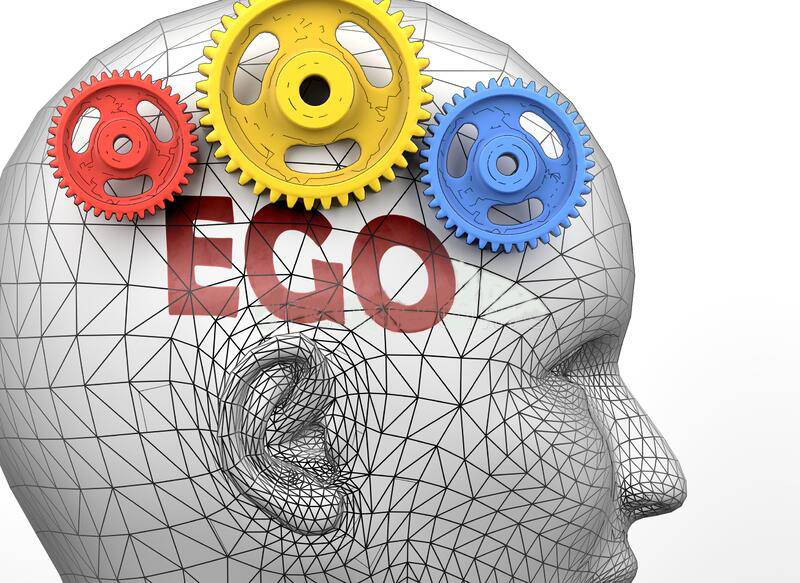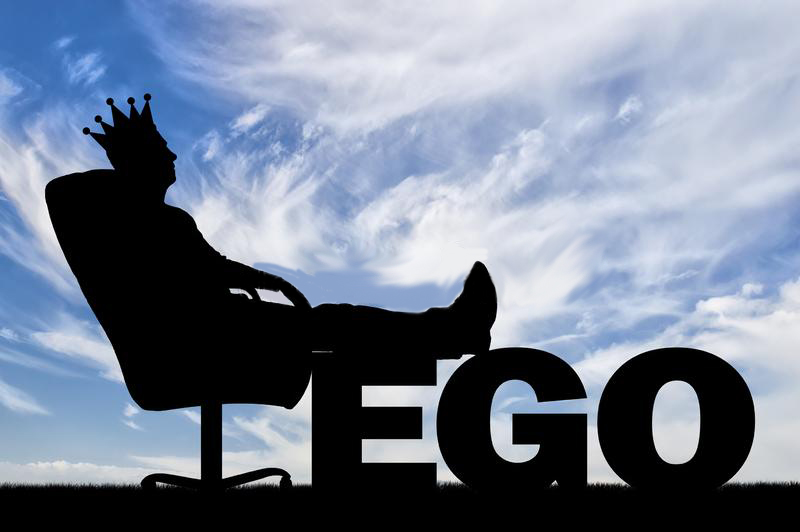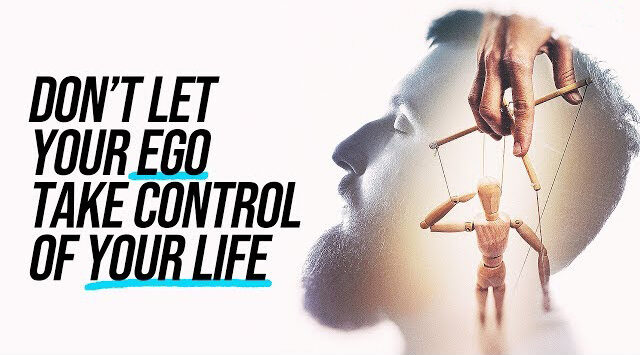Human Ego- Good, Bad and the Necessary

If we want or need to understand Human Ego, we must first consider Humanity. Humanity has arrived at a fork in the road where it must either awaken or perish since we have been living and operating collective egos that have literarily killed humanity. We must awaken and become the people we were born to be.
The voices we hear in our heads are manifestations of ego, which is an illusion of self. The voice in our heads is only a mental process, not who we are. The voice is the human Ego, which is built on memories and fears for the future. It prevents us from enjoying life right now since one’s vision of life is built on past mistakes, memories, hurt, and endless worries about days to come.
We would labour so hard and collect power to enhance the ego since it is more concerned with having. Hence we spend most of our lives blaming other people and situations for our lack of happiness, rather than seeing that our ego is the source of our misery. We may rise beyond the need to listen to our inner voices and become who we are meant to be, enjoying life today, once we realise this.
Anger and resentment toward individuals or things that are perceived as impediments to happiness are fuel for the Human Ego. Complaining and carrying grudges enhance it. Complaining does not lead to answers; rather, it serves to demonstrate who is right or superior.
A person’s ego is defined as their sense of self-importance. Ego can be useful at times. It gives us the ability to push and do things we’re afraid of.
Healthy doses of ego, according to one study, directly feed into your willpower, which could help you stick to a diet or focus on a major project, for example. According to Bentley, having an ego can also help you stay resilient when things go wrong. When used correctly, an ego can also aid in our development.
“The ego also provides us with vulnerability, allowing us to say, ‘I’m sorry, it’s my fault, It enables us to enter something and say, ‘I’m scared.’ I’m terrified. I’m not sure if I have all of the necessary information. I think I need to learn more and everything else that allows us to be vulnerable in order to grow.
An unhealthy Human ego, on the other hand, can lead to arrogance.
While the ego can produce positive outcomes, an unhealthy ego can reverse all of that positivity. Over-exerting your ego can lead to exhaustion, which can deplete your willpower to stick to healthy habits, according to one study. People with unhealthy egos experience fear and defensiveness instead of vulnerability.
“When the ego pushes us into fear and scarcity, it works against us. When fear and scarcity are pushed upon us, we do things that are harmful to ourselves and others. That is where our resiliency is lacking. It disables vulnerability.
Psychology experts say, “I point out when their ego is sabotaging them. When I see them shutting down their vulnerability, I know it’s because they’re afraid. That’s when we go inside and help them figure out what’s really going on.
The ego isn’t the issue; we’ve turned it against us.
The ego has a bad rep and has become the self-help villain. We associate it with arrogance and entitlement. That is why we seek to eliminate this foe.
However, it is the illusion of self that is the problem, not the ego.
According to psychologists, we would become mentally ill if we didn’t have an ego. It is required to act as a bridge between the unconscious and the conscious. Your ego can become an ally or an enemy depending on how you interact with it.
The ego is responsible for the majority of your suffering, but it can also protect you from further suffering.
The Ego is a Swindler

The Human ego is the worst confidence deceiver we can think of.
Our ego is a strange beast; most of us are unaware of its existence, but we are at its mercy.
The word “ego” conjures up images of arrogance, pride, and selfishness. Our ego, on the other hand, magnifies either our best or worst qualities. As a result, the ego is the worst confidence thief: we end up buying an exaggerated version of ourselves.
We succumb to our ego because the illusory self is a seductive fantasy. We let it take control of our lives without question.
Human ego is hidden in the last place you’d expect to find it: within itself. Your ego deceives you by posing as thoughts or feelings. When you believe you are your ego, you will go to great lengths to maintain that illusion.
When you want to be known as the smartest boss, the best negotiator, the kindest woman, the funniest guy, the most creative writer — fill in the blanks — you let your ego take control. Maintaining that perfect image becomes a life-or-death situation when you self-identify with a single aspect of yourself.
We not only place hope on an impossible goal by wanting to keep our illusory-self happy, but we also harm ourselves and others by doing so. To protect their ego boundaries, people are willing to lie, kill, cheat, hide, or steal. When someone criticises that “perfect” side of them, they take it personally and believe their entire identity is in jeopardy.
What is going on with me? Everyone wants to be in my company. Why is this individual attempting to harm me? Nobody pays attention to me!
We’re egotistical; we make everything about “me-me-me!” Everything, we believe, revolves around us. We evaluate events through a self-centered lens.
The paradox of the unhealthy ego is that, while it appears to boost confidence, it actually causes more harm. We create self-doubt by comparing ourselves to others. And we end up disappointed after pursuing endless ambitions. We become bitter and frustrated when we pretend that things always go our way.
The unhealthy ego is a liar; don’t believe your fictitious self.
Ego Isn’t Necessary
“Filling a man’s shoes becomes easier as his head grows larger.”
The majority of people believe they know themselves, but only about 15% of them are truly self-aware. We become victims of the illusory-self when we are self-centered or have a distortion of who we are.
The Human ego is your “I-ness”; it encompasses all of your thoughts, beliefs, memories, and emotions, whether positive or negative. The issue is not with the beast, but with the role it plays.
We need something to mediate between our desires and our beliefs and values, and having no ego would be disastrous. We would be helpless or mentally ill if we didn’t have it.
The ego’s insatiable desire for attention and power undermines our desired outcome.
It’s exhausting to deal with an unhealthy Human ego.
We are shadowed by a persistent sense of weariness and self-doubt as we strive to become richer, smarter, better, stronger, or more attractive than others. You don’t need another ego; all you need to do is be yourself.
Our ego craves safety, predictability, and repetition. By reinforcing an idealised version of ourselves, it makes us feel at ease. We turn people into enemies if they threaten that illusion. That is why ego-driven people are constantly fighting — they want to protect their fragile self-image.
The irony is that we fight to maintain a self-image that no one but ourselves believes in.
Your inner perception, not your ego, is your greatest foe.
The Birth of an Ego
“The ego is a method of organising oneself; it emerges from the intellect as the mind begins to register.”
You exist, so I exist — this is how the ego emerges.
The ‘Mirror Stage,’ coined by French psychoanalyst Jacques Lacan, describes the phenomenon when a child begins to distinguish between the ‘self’ and others — seeing oneself in the mirror makes us realise we are autonomous.
Fear and isolation give rise to the ego. It shapes our identity and distinguishes us from our peers when we were children.
According to Chögyam Trungpa, the process of identifying the self in terms of opposing ourselves to others is the birth of ego. We begin to see others before we recognise our own existence. We want to conquer others, which feeds passion, aggression, and ignorance in a snowball effect.
Not only does our ego blind us, but it also blinds others. We want to impose our options on others — whatever we see, we want others to see as well. We believe that our worldview is the worldview.
The illusion of self extends beyond having a distorted perception of ourselves. We want to keep that image for the rest of our lives.
We want to believe that our identity is eternal, but life is fluid, not rigid. Our sense of self-existence is not permanent because we are constantly changing. We can’t take our personalities with us into the next life.
Many people believe that the ego is nothing more than a source of conflict. A healthy, functioning ego, according to American Buddhist author Thanissaro Bhikkhu, is a critical tool on the path to awakening.
The ego is a creation, according to both Western psychology and Buddhism, and we must get it out of our heads and learn to control our minds.
Being Yourself Is an Illusion
“When no one is looking, you are who you are.”

We wear an identity that isn’t real because of the illusion of self.
When we feel threatened or panicked, we create a world of duality, which Chögyam Trungpa calls “the world of ego.” This deceptive and pointless invention prevents us from seeing our true selves clearly.
The antidote to the illusion of self, according to Buddhists, is egolessness.
The majority of people associate egolessness with the elimination of the ego. That, however, is a misconception; the ego is necessary for us to make decisions and act in certain ways. The term “spiritual bypassing” refers to people who use spiritual ideas and practises to avoid dealing with unresolved emotional issues. Rather than running away from our ego, we must confront it.
Not the Human ego, but the illusion of who you are must be overcome.
Let go of your preconceived notions of who you are. The majority of them were made when you were a child. You made something very positive or negative about yourself your identity — balancing your ego means accepting all of your sides rather than exaggerating one.
Egolessness is a healthy mental state.
The ideas we’ve formed about ourselves are set in stone. Most people overreact to criticism because they’ve built their “reputation” on a single idealised trait, and they fear that if others dislike it, their entire identity will crumble.
Most of us will go to any length to protect our false sense of self. We fight back when we are confronted with something unpleasant that threatens our idealised identity.
It is critical to become more mindful. We can’t cling to what’s pleasant or condemn what’s unpleasant when we’re mindful. Although we don’t believe in the ego’s deception; we are more than that. You can separate the stimulus from your emotional response — you, not your ego, decide how to react.
Change your ego’s attitude from enemy to friend.
“I was clever yesterday, so I wanted to change the world.” Because I am wise today, I am altering myself.” Rumi is a Persian poet.
The majority of the characteristics that define our identity are inherited, and we have little control over them. But, just like our ego, we can change how we deal with them.
We must flex our ego in order to stop fighting reality.
We become free when we let go of our idealised self. On the other hand, when the ego is in charge of our lives, we suffer. The “me-me-me” mentality is exhausting, and forcing the world to revolve around us is impossible.
Psychologists advise empowering the observing “I” by making space for self-reflection and keeping a safe distance from yourself. Face all aspects of yourself, especially the ones that are uncomfortable. Make some space for yourself. Let go of perfectionism and observe your thoughts rather than buying into them.
Buddhists encourage us to be mindful of our thoughts, to observe them without judgement. The ability to be present, to be with what is happening in the present moment, is known as mindfulness. It’s a journey to let go of the illusion of self in the name of happiness and well-being.
Egolessness refers to the removal of the illusion self rather than the ego. We need to break old habits that have been ingrained in us for years.
We are liberated from the anxiety of defending the illusion of who we are when we are egoless.
Stop viewing the ego as an enemy as an antidote

“You, more than anyone else in the universe, are deserving of your love and affection.” — Buddha
Your identity is fluid rather than fixed.
Our natural tendency is to see things as permanent, not just ourselves but others as well. It is critical to recognise that everything is interconnected and impermanent.
The ego’s illusion is when we believe our identity is a completed product rather than a work in progress.
Take a few pictures of yourself at various times. Isn’t it true that you’ve changed your appearance? Examine how your personality or way of life has evolved over time. Are you the same person you used to be? Or have you changed your mind? Fluidity entails integrating both our differences and similarities.
Nothing stays the same and everything changes. “No one ever steps into the same river twice,” Heraclitus said, “for it is not the same river and one is not the same person.”
That is the perplexity of comprehending impermanence. We, the same people, aren’t the same people we used to be, but we’re still ourselves. Facing your true self is the antidote to the illusion.
Don’t be too hard on yourself. You are not the centre of the universe. Don’t get too attached to the phantom of self. Accept happiness and well-being.
You are a moving target, not a static one. Don’t cling to a fictitious self; one part of you isn’t you. When someone hurts one aspect of your personality, don’t get defensive.
Individuals are not your adversaries. You don’t feel the need to fight others when you’re at peace with yourself.
Increase your sense of self-awareness. Meditation allows us to delve deeply into the emptiness or illusoriness of self and habitual patterns, resulting in egolessness.
Not your image, but yourself. Accept yourself in all of your parts, good and bad. Appreciating that others feel self-love is true self-love.
Stop attempting to be flawless. I’m not suggesting you lower your standards; instead, recognise that you are a work in progress rather than a finished product.
Vulnerability is a sign of strength. To be accepted by others, you don’t have to maintain an idealised version of yourself. Masks are delicate, but nothing beats being yourself.
The idealised image of yourself is the enemy, not the ego. Defending an illusion is a pointless and exhausting fight. Stop faking it and start accepting it. Spend some time this time of year reflecting on who you are rather than just your accomplishments.
Remove the illusion of a flawless self.
Note: Contact our Writers at www.eastsidewriters.com for writing Blogs/Articles on any niche. We have experts in various domains from Technology to Finance and from Spirituality to Lifestyle and Entertainment. and Entertainment.







Pingback: Anger And Ego - The Path To Self Destruction
Pingback: The Third Eye or Kutastha: Mysteries and the Importance of Opening It - Eastside Writers
Pingback: The Gateway To Super-Consciousness: The Profound Spiritual Significance Of The Medulla Oblongata - Eastside Writers
Pingback: The Delicate Balance: Humility, Self-Promotion, and Generosity of Ideas - Eastside Writers